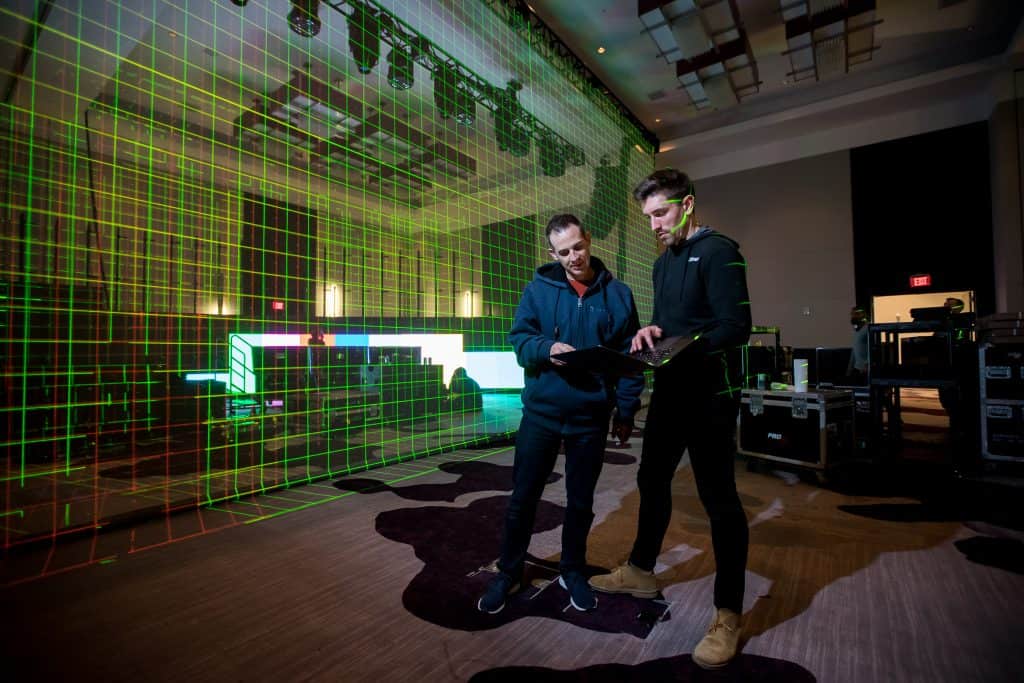Understanding Event Production: Why It Is Vital for Effective Gatherings
Event production plays a critical function in forming successful events. It involves cautious preparation, control, and execution to ensure every information lines up with the event's vision. This procedure not just enhances guest experiences yet also promotes meaningful connections among individuals. Recognizing the complexities of event production can substantially impact the general end result. What are the key elements that add to an effective event, and exactly how can they be effectively managed?
The Function of Event Production in Developing Remarkable Experiences
Although numerous aspects add to the success of an event, event production plays a critical duty in crafting remarkable experiences. This complex process incorporates various elements, including planning, logistics, and execution. Efficient event production assurances that every information lines up with the general vision, developing a smooth circulation that mesmerizes guests. By collaborating timelines, handling sources, and managing technological elements, event producers establish a foundation for impactful experiences.Moreover, they curate environments that reverberate with the target market, boosting involvement and psychological connection. From selecting suitable places to incorporating ingenious innovation, the options made during production greatly influence how participants view and keep in mind the event. By focusing on top quality and focus to detail, event production transforms ordinary celebrations into amazing moments, leaving long-term impacts. Eventually, the skilled orchestration of these components specifies the essence of an occasion, showcasing the value of professional event production in attaining remarkable end results.
Secret Components of Effective Event Production
Reliable event production rests on numerous key elements that guarantee success. Planning and coordination develop a solid foundation, while technological arrangement requirements resolve logistical requirements. Furthermore, carrying out target market engagement strategies improves the total experience, making the event memorable.
Planning and Sychronisation
Preparation and coordination work as the backbone of successful event production, making sure that every information aligns perfectly to produce a remarkable experience. Reliable preparation involves establishing a clear vision and objectives, while sychronisation involves the careful company of logistics, timetables, and sources. A distinct timeline is crucial, guiding all stakeholders through vital turning points and tasks. Communication plays a critical function, promoting partnership among team members, vendors, and location staff. Normal conferences and updates aid to attend to obstacles without delay, making certain that every person continues to be lined up with the event goals. Ultimately, a structured strategy to preparation and sychronisation not only enhances performance but likewise significantly adds to the total success and satisfaction of the event for guests and organizers alike.
Technical Setup Needs
A successful event depends heavily on its technological setup requirements, which encompass vital parts such as audio-visual equipment, lighting, staging, and connectivity. Audio-visual tools includes microphones, speakers, and projectors, making certain that presentations and performances are provided clearly. Correct lighting boosts the atmosphere and highlights key locations, while staging supplies the needed platform for audio speakers and entertainers. Connectivity, consisting of Wi-Fi and electrical accessibility, is important for smooth communication and modern technology integration. Each part must be diligently planned and implemented, tailored to the event's certain demands. Inadequate technological configurations can lead to interruptions, adversely impacting the general experience for participants, underscoring the significance of detailed preparation and interest to information in event production.
Target Market Engagement Techniques

The Importance of Planning and Coordination
Planning and coordination are important to the success of any kind of event production. Reliable timeline monitoring, source appropriation strategies, and team communication characteristics play essential roles in ensuring that all elements come together seamlessly. Without a structured approach to these facets, events take the chance of encountering hold-ups, budget plan overruns, and miscommunication among employee.
Reliable Timeline Monitoring


While successful event production typically rests on creative thinking and implementation, reliable timeline administration stays a crucial component that can not be overlooked. A well-structured timeline acts as the foundation of any kind of event, making certain that each phase is performed in a timely manner. It permits the coordination of various jobs, from place arrangement to visitor arrivals, while stopping prospective bottlenecks. By clearly outlining target dates and duties, event planners can preserve focus and adjust to unpredicted obstacles. Furthermore, a carefully crafted timeline fosters interaction amongst employee, advertising responsibility and collaboration. Ultimately, reliable timeline administration not only boosts operational efficiency yet likewise adds considerably to the general success and smooth implementation of the event, leaving guests with a memorable experience.
Source Allowance Strategies
Reliable resource appropriation methods are essential for the effective execution of any kind of event. Appropriate preparation enables event view publisher site coordinators to identify and disperse resources, such as financial resources, personnel, and products, in a fashion that optimizes efficiency. By examining the specific requirements of each facet of the event, organizers can focus on jobs and assign sources accordingly. Sychronisation amongst various departments makes sure that all components, from dealing with audiovisual requirements, are properly sustained. This calculated method not just decreases waste but likewise boosts the total experience for attendees. Furthermore, expecting possible challenges and having contingency plans in position allows for smoother procedures. Inevitably, reliable source appropriation adds considerably to attaining event objectives and guaranteeing a memorable event.
Team Communication Dynamics
Exactly how can seamless communication among staff member transform the event production process? Effective communication is important for collaborating tasks, sharing updates, and dealing with difficulties in real-time. When employee engage in open dialogue, they can rapidly identify potential concerns and create remedies collaboratively, decreasing hold-ups and misconceptions. This dynamic fosters a cohesive setting where every person recognizes their roles and obligations, causing a much more synchronized initiative. Furthermore, routine check-ins and feedback loopholes improve accountability and guarantee placement with the event's goals. By prioritizing interaction methods, teams can simplify process, reinforce morale, and eventually elevate the total high quality of the event. Successful celebrations hinge on the ability to connect efficiently, making it a vital component of event production.
Enhancing Guest Engagement Via Creative Layout
Innovative style plays a vital duty in enhancing participant engagement at events, as it cultivates an immersive atmosphere that captivates participants' attention. By integrating cutting-edge visuals, interactive aspects, and thematic style, event coordinators can produce unforgettable experiences that resonate with attendees. Thoughtful format styles advertise motion and exploration, encouraging visitors to interact with screens and each other.Incorporating modern technology, such as augmented truth or live polling, more enriches the experience, permitting real-time responses and communication. Furthermore, sensory components like illumination, sound, and aroma can evoke feelings and produce a more interesting atmosphere.The usage of storytelling via style aids communicate the event's purpose and message, making it much more relatable for guests. Eventually, creative style not just improves interaction however likewise deepens connections amongst individuals, leaving a long-term impact that expands past the event itself. This calculated approach to style is essential for effective gatherings.
Managing Logistics for a Smooth Implementation
While the exhilaration of an occasion can attract participants in, handling logistics is important to protect a seamless execution. This involves meticulously coordinating various components, from place option and design to wedding catering and transport. Efficient logistics administration guarantees that all components straighten, enabling a smooth flow from registration to the conclusion of the event.Additionally, a clear interaction plan among all stakeholders is necessary. This consists of staff, suppliers, and volunteers, that should be educated of their duties and obligations. Anticipating possible difficulties, such as equipment failing or unexpected weather, can further boost the event's success.Creating an in-depth timeline assists maintain the team on course and permits prompt changes. Ultimately, well-managed logistics not just help with an enjoyable experience for participants but additionally reflect the professionalism and dependability of the organizers, adding to the general success of the celebration.

The Effect of Technology on Event Production
What role does technology play in forming contemporary event production? Technology has actually ended up being a foundation of effective event production, boosting both preparing and implementation procedures. From innovative registration systems to interactive applications, innovation streamlines participant administration and enhances involvement. Virtual event systems allow organizers to get to broader audiences, breaking geographical obstacles and assisting in hybrid gatherings that integrate in-person and online experiences.Additionally, audiovisual modern technologies, such as high-definition displays and sound systems, raise you could look here the top quality of presentations and efficiencies, guaranteeing a remarkable experience for attendees - event production charlotte. Social network assimilation allows real-time responses and interaction, promoting area engagement before, throughout, and after the event. Information analytics devices aid organizers in keeping an eye on individual behavior and preferences, making it possible for customized experiences that resonate with diverse audiences. On the whole, the integration of innovation in event production not just boosts operational efficiency however additionally improves attendee experiences, ultimately contributing to the success of the event
Reviewing Success: Determining the Results of Your Event
Success in event production rests on our website reliable evaluation, which involves determining a selection of end results to assess the overall influence of an occasion. To achieve this, organizers can employ both qualitative and quantitative metrics. Quantitative measures may include attendance figures, ticket sales, and revenue generated, while qualitative assessments might involve attendee fulfillment studies and responses forms.Additionally, examining social media engagement and media coverage can give understandings right into the event's reach and brand effect. Comparing these metrics against predefined goals helps figure out if the purposes were met.Furthermore, post-event debriefs with the planning team can reveal lessons discovered and locations for enhancement. By systematically reviewing these outcomes, event producers can enhance future celebrations, ensuring continual development and success. Inevitably, a detailed analysis not only highlights achievements yet likewise informs strategic choices for subsequent events, cultivating a society of excellence in event production.
Regularly Asked Concerns
What Qualifications Should an Occasion Producer Have?
Event manufacturers ought to possess solid organizational abilities, creativity, and reliable communication abilities. A history in project administration, budgeting, and negotiation is crucial. Appropriate qualifications and experience in diverse event kinds even more boost their certifications.
How Can I Minimize Event Production Costs Successfully?
To effectively minimize event production prices, one can improve supplier selection, discuss contracts, use internal resources, prioritize crucial aspects, apply technology for performance, and explore sponsorship chances to balance out expenses without jeopardizing top quality.
What Are the Common Difficulties in Event Production?
Usual challenges in event production include budget plan restraints, logistical coordination, vendor administration, time restrictions, participant engagement, technical problems, and unanticipated conditions - event production charlotte. Each factor can significantly affect the total success and smooth implementation of the event
Just how Do I Pick the Right Venue for My Event?
Choosing the best location involves considering factors such as location, capability, facilities, and budget plan. Furthermore, examining availability and setting assures the picked area lines up with the event's objectives and enhances the general participant experience.
What Is the Common Timeline for Preparation an Occasion?
The regular timeline for preparing an occasion differs, however normally consists of phases such as principle growth, location choice, vendor coordination, promotion, and last prep work, usually extending a number of months to ensure a successful implementation.